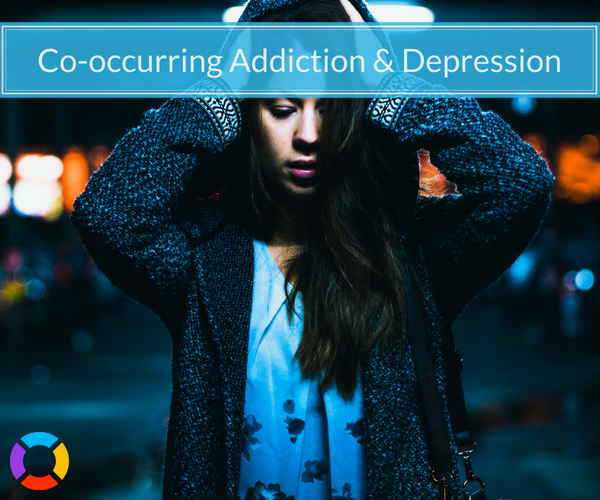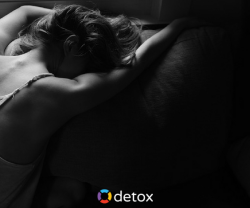Depression and Addiction: Causes, Symptoms and Treatment Options

Depression and addiction are closely linked conditions that often co-occur, creating what’s known as a dual diagnosis.
Depression is a mood disorder marked by persistent sadness, hopelessness and loss of interest in life. Addiction, or substance use disorder, involves compulsive drug or alcohol use despite negative consequences.
When combined, depression and addiction feed into one another. Depression may drive you to use drugs or alcohol to relieve symptoms, while substance use worsens depressive symptoms. This dangerous cycle of depression and substance abuse raises the risk of relapse, self-harm and long-term health issues.
We’ll explore the complex connection between addiction and depression by examining the causes, warning signs and symptoms of both conditions.
You’ll discover the risks of untreated depression and drug abuse, evidence-based treatment options and recovery support. Finally, we’ll answer common FAQs about co-occurring depression and substance use, offering hope and practical steps toward healing.
Need help with your detox journey? Call now to speak with someone.
What is Depression?
Sadness is a normal human emotion, but clinical depression is different. It’s a serious mental health condition. While it can develop at any age, it often begins in adolescence or early adulthood.
It doesn’t simply “go away” and often requires treatment and support. Factors that contribute to depression include genetics, brain chemistry, trauma or stressful life events.
The most common and most severe type is major depressive disorder (MDD). Different types of depression include seasonal affective disorder, postpartum depression, premenstrual dysphoric disorder and persistent depressive disorder.
The DSM-5 (Diagnostic and Statistical Manual of Mental Disorders, Fifth Edition) from the American Psychiatric Association provides standardized criteria for diagnosing mental health disorders.
According to the DSM-5, major depressive disorder is diagnosed when symptoms such as persistent sadness, loss of interest, changes in sleep or appetite, fatigue, and feelings of worthlessness last for at least two weeks and interfere with daily life.
Take control of your recovery with practical tools. Get our SMART Goals Worksheet and Relapse Prevention Plan to build structure and confidence in your healing journey.
Types of Depression That Often Overlap with Addiction
Depression and addiction often occur together, creating challenges that can make recovery more complex.
Certain types of depression are more likely to overlap with substance use, as you may turn to drugs or alcohol to cope with symptoms. Understanding these forms of depression can help explain why dual diagnosis treatment for both conditions is often crucial to recovery.
Major Depressive Disorder
Major depressive disorder presents with persistent symptoms of sadness, hopelessness and loss of interest in daily life for at least two weeks. It can also cause changes in sleep, appetite, energy, and concentration. Addiction often worsens symptoms.
Bipolar Depression
Bipolar depression is linked to mood swings, such as manic highs and depressive lows.
During the depression phase, you experience intense depressive episodes with symptoms that can include deep sadness, fatigue, and difficulty functioning. You may turn to alcohol or drugs during either phase, which increases the risk of developing a dual diagnosis.
Persistent Depressive Disorder (Dysthymia)
This long-term form of depression has milder symptoms than MDD but can last for years. You are typically able to function daily, but often feel consistently low or joyless. It can drive substance use as you may attempt to “numb” symptoms, making recovery more complex.
Seasonal Affective Disorder
Seasonal affective disorder follows seasonal patterns, typically appearing when there is less sunlight. Symptoms often disappear during the spring and summer months. If alcohol or marijuana is used to cope, it usually worsens depressive cycles.
Drug-Induced Depression
Drug-induced depression is triggered directly by substances like alcohol, cocaine, methamphetamine, fentanyl, marijuana or certain medications. Pills that cause depression may trigger ongoing mood disorders. However, this type of depression often improves once the substance use reduces or stops.
Causes of Depression and Addiction

Understanding the causes of depression and addiction requires looking at biological and environmental influences.
One major factor is genetic predisposition. A family history of mental illness or substance abuse can increase your vulnerability. Brain chemistry also plays a role. Imbalances in neurotransmitters may contribute to depression while also increasing the appeal of substance use as a form of self-medication.
Trauma, stress and abuse are powerful causes of depression that can trigger the development of poor coping mechanisms, including using addictive substances. Social isolation, lack of support and exposure to environments where substance use is common also heighten risk.
Does finasteride cause depression? Certain medications can trigger depression, such as Cymbalta, Depo-Provera, finasteride and Ativan. When depression develops alongside drug or alcohol use, the symptoms of each fuel the other condition, creating a cycle that is difficult to break.
Call today and see if your medications could trigger your depression.
The Cycle Between Depression and Addiction
Depression and addiction often fuel each other in a cycle that is difficult to break. You may have turned to substances to ease emotional pain, but drug or alcohol use can worsen depression over time, creating a repeating loop.
Can You Be Addicted to Depression?
Can you become addicted to depression? The answer is not a simple yes or no. Depression itself isn’t addictive, but the relief you might experience using substances can reinforce dependency, binding depression and addiction into a vicious cycle.
Depression can feel reinforcing, almost like you are addicted to sadness. Negative thought patterns, isolation and hopelessness may create a cycle where you feel an addiction to depression.
This doesn’t mean depression is an addiction. However, your brain can adapt to sadness, making it harder to break free. In this sense, depression is addictive because the familiar cycle of numbness and despair feels strangely safe, even when it’s painful.
Breaking the cycle between depression and addiction takes more than willpower. Use our Relapse Prevention Plan and Smart Goals Worksheet to create practical tools for managing triggers, whether from depression to cravings.
How Addiction Makes Depression Worse
When a person stops using substances, withdrawal symptoms can trigger sadness, irritability and anxiety, making depression feel more severe.
Brain chemistry also plays a significant role. Substance abuse lowers dopamine and serotonin, the “feel-good” chemicals, which deepens hopelessness.
Over time, this imbalance makes it harder to feel joy without drugs or alcohol. Addiction also leads to increased isolation, damaged relationships and financial or legal stress, which further fuels feelings of worthlessness.
You may wonder, “How does addiction affect mental health?” or, “What drugs can cause depression?” The truth is, substance abuse and depression often reinforce each other. Depression may lead to substance use for temporary relief, while ongoing use worsens moods long-term.
Understanding how addiction-depression cycles work is crucial for healing. Breaking free requires treating both conditions simultaneously to restore balance and hope.
Short-Term & Long-Term Effects of Depression and Addiction
Depression and addiction can cause both immediate and lasting harm to your mental, physical, and emotional health. While short-term effects may disrupt daily functioning, the long-term impact can deeply affect your relationships, career, overall emotional well-being and quality of life.
Short-Term Impacts
The short-term effects of depression and addiction typically appear quickly. Mood swings become more frequent, making it difficult to stay emotionally stable.
Poor work performance is another common issue, as your concentration, motivation and energy levels decline. At the same time, depression and substance use often strain personal relationships, leading to arguments, broken trust or withdrawal from loved ones.
The short-term struggles may seem manageable at first but they can quickly spiral into deeper problems if left untreated. When depression and substance use occur together, the effects multiply, making it harder to cope with stress, meet responsibilities or maintain stability in everyday life.
Recognizing these warning signs early is critical, as short-term issues can develop into more serious long-term consequences. By addressing both depression and addiction simultaneously, you can break the cycle before it worsens.
Long-Term Impacts
The long-term effects of depression and addiction can be devastating and potentially life-threatening if left untreated. Prolonged substance abuse combined with chronic depression significantly heightens the risk of suicide and self-harm, as emotional pain becomes harder to manage.
Over time, you develop a higher tolerance to substances, increasing the likelihood of overdose while using more to get the same effect.
Frequent hospitalizations for psychiatric crises, poor physical health, or other medical complications are also common. Furthermore, untreated depression and addiction contribute to chronic illnesses such as heart disease, liver damage, diabetes and a weakened immune system.
These long-term consequences can erode relationships, financial stability and overall quality of life, making depression and addiction recovery more challenging. Addressing the dangers of depression and addiction early through integrated treatment, called dual diagnosis care, focuses on both mental health and substance use.
Statistics on Depression and Addiction
Recent depression and addiction statistics reveal a strong connection between the two conditions. Nearly 50% of people with substance use disorders also have a mental health condition, including depression, highlighting the widespread link between substance abuse and depression.
When you live with both conditions, you face significantly higher rates of suicide and self-harm compared to those with a single diagnosis. Additionally, co-occurring depression and addiction often contribute to unemployment, financial strain, and even long-term disability, making recovery more challenging.
Research also shows notable gender differences. Women are more likely to experience depression, while men have higher rates of substance abuse. These combined factors demonstrate the urgent need for integrated treatment strategies focused on both mental health and addiction recovery.
Understanding these statistics can help you and your family make informed decisions, seek appropriate care, and improve long-term outcomes in depression and addiction recovery.
You can overcome the odds! Call today for help.
Depression and Specific Substances
Different substances affect depression differently, sometimes masking symptoms in the short term while worsening them over time. Understanding how specific drugs interact with depression helps explain why co-occurring disorders often require specialized treatment.
Alcohol and Depression
Alcohol and depression are strongly connected. Drinking may feel like short-term relief, but alcohol does make depression worse and increases suicide risk.
You may experience depression from quitting alcohol, which can trigger relapse. This is why alcoholism and depression often require dual treatment, including working with facilities and professionals experienced with alcohol and depression detox and long-term therapy.
Marijuana and Depression
Some turn to cannabis to cope, but research shows a bidirectional link between marijuana and depression. This means marijuana use can trigger depression and regular drug use can dull motivation and worsen mood over time, making recovery more difficult.
Cocaine, Stimulants & Other Substances
Cocaine, stimulants, psychedelics, and prescription drug misuse often lead to depression.
Following the stimulating effects of cocaine, you may experience a “cocaine crash,” which results in depression, exhaustion and difficulty sleeping. Stimulant misuse can trigger long-term mood instability. Psychedelics may also worsen depression in vulnerable individuals.
Detox and Treatment for Depression and Addiction
Detox and treatment programs address both the physical and emotional challenges of depression and addiction, offering a structured way to begin recovery. With medical support, therapy, and long-term care, these programs help restore balance and create a foundation for lasting healing.
Detox for Depression and Addiction
Detox is often the first step in recovery when depression and addiction occur together. For alcohol or drug use, detox helps clear substances from the body, but withdrawal depression can intensify during this stage.
You may have heard the expression “depression detox,” which refers to depression-like symptoms that can happen during detox from certain addictive substances. It does not mean you are detoxing from depression.
True recovery requires professional support, not quick fixes. Medical supervision is recommended, especially for alcohol detox or antidepressant withdrawal, such as Cymbalta detox.
Inpatient & Residential Treatment
Inpatient treatment for depression and addiction is recommended for severe cases. Rehab centers can provide dual diagnosis programs that address both conditions at the same time.
This increases the potential for successful recovery since these conditions affect each other. Residential settings offer 24/7 care and structured routines that support long-term stability.
Outpatient and Therapy Options
When you don’t need inpatient care, outpatient therapy offers cognitive behavioral therapy (CBT), dialectical behavior therapy (DBT) and group counseling. Treating both conditions together is essential to achieve the best results.
You may benefit from structured tools like a Relapse Prevention Plan and SMART Goals Worksheet, which help put insights into action. Download those today!
Medications for Depression and Addiction
Medication can play an important role in your recovery since it addresses both mood symptoms and substance use challenges. Antidepressants like Celexa, Cymbalta or Wellbutrin may help regulate brain chemistry and ease depressive symptoms, relieving persistent feelings of sadness or hopelessness.
Addiction medications like Antabuse, Campral, methadone, or buprenorphine can reduce cravings, ease withdrawal symptoms and support long term sobriety. When medications are combined with evidence-based therapy and lifestyle changes, they can make recovery more stable and sustainable.
How to Support Someone with Depression and Addiction
Supporting a loved one facing both depression and addiction can be challenging, but your role is incredibly important.
The first step is understanding that both are medical conditions, not personal failures. Show compassion, patience and encouragement to help them feel less isolated. Listen without judgment. Gently encourage professional treatment programs for dual diagnosis.
Remember, safety comes first! If your loved one shows signs of suicidal thoughts, severe withdrawal or risky behaviors, seek immediate crisis/medical help.
Finally, remember to take care of yourself. Counseling and family support groups can provide coping strategies and hope.
Need help supporting a loved one? Call now.
FAQ: Depression and Addiction
Some people feel “addicted to sadness” or “addicted to being depressed” because negative thought cycles become hard to break.
While it is not a true addiction, the patterns of rumination and emotional dependence on familiar feelings can make it difficult to move forward without professional support.
No, but it can mimic addiction-like patterns. Persistent sadness and hopeless thoughts may create cycles of behavior that feel difficult to escape, much like the grip of a substance addiction.
Depression can feel “addictive” because the emotions, though painful, become familiar and predictable.
This sense of familiarity may feel safer than facing the uncertainty of change or recovery. Over time, the brain can even reinforce negative thought patterns, making it harder to break away from the cycle without support.
It’s sadness tied to longing for the past, often fueling addiction. This can intensify feelings of loss or regret, making it difficult to stay focused on the present or move forward.
Breaking the Cycle of Depression and Addiction
Depression and addiction often create a destructive cycle that can feel impossible to escape. Depression lowers motivation, while addiction provides temporary relief that deepens despair.
Without proper treatment, the risk increases. Suicide, overdose, hospitalization and chronic illness are common long-term dangers of depression and addiction.
Recovery is possible with the right treatment for depression and addiction, including detox, therapy, medication and dual diagnosis treatment.
With professional help, family support, and effective strategies, depression and addiction recovery are achievable. If you or a loved one is struggling, don’t wait: reach out to a trusted treatment center today and take the first step toward breaking free from depression and addiction.



